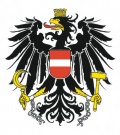Wagna: Difference between revisions
Jump to navigation
Jump to search
Knorrepoes (talk | contribs) m (Text replacement - "====Origin/meaning====" to "===Origin/meaning===") |
Knorrepoes (talk | contribs) m (Text replacement - "{{at}}↵↵'''" to "'''") |
||
| (12 intermediate revisions by the same user not shown) | |||
| Line 1: | Line 1: | ||
'''WAGNA''' | '''WAGNA''' | ||
| Line 6: | Line 4: | ||
District : Leibnitz | District : Leibnitz | ||
[[File:wagna.jpg|center|Wappen von {{PAGENAME}}]] | [[File:wagna.jpg|center|alt=Wappen von {{PAGENAME}}/Arms (crest) of {{PAGENAME}}]] | ||
= | {| class="wikitable" | ||
|+Official blazon | |||
|- | |||
|'''German''' | |||
| blazon wanted | |||
|- | |||
|'''English''' | |||
| blazon wanted | |||
|} | |||
===Origin/meaning=== | ===Origin/meaning=== | ||
| Line 17: | Line 23: | ||
The design of the arms follows a coin from Roman times, found during excavations. It illustrates the saying "friendship is the key to harvest". | The design of the arms follows a coin from Roman times, found during excavations. It illustrates the saying "friendship is the key to harvest". | ||
{{at}} | |||
{{media}} | {{media}} | ||
Latest revision as of 05:55, 27 September 2023
WAGNA
State : Steiermark
District : Leibnitz
| German | blazon wanted |
| English | blazon wanted |
Origin/meaning
The arms were granted on July 11, 1960.
Wagna has a long history which goes back to a settlement of Celts in today's municipality. Out of this settlement grew the municipium Flavia Solva. This survived as long as the Roman Empire continued.
The design of the arms follows a coin from Roman times, found during excavations. It illustrates the saying "friendship is the key to harvest".
Austria heraldry portal
This page is part of the Austria heraldry portal |
Heraldry of the World |
|
Civic heraldry:
|
Other heraldry: |
Contact and Support
Partners:
Your logo here ?
Contact us
© since 1995, Heraldry of the World, Ralf Hartemink 
Index of the site
Literature : Image provided by Karl Palfrader (k.palfrader@aon.at), MStLA 12 (1962), p. 46












